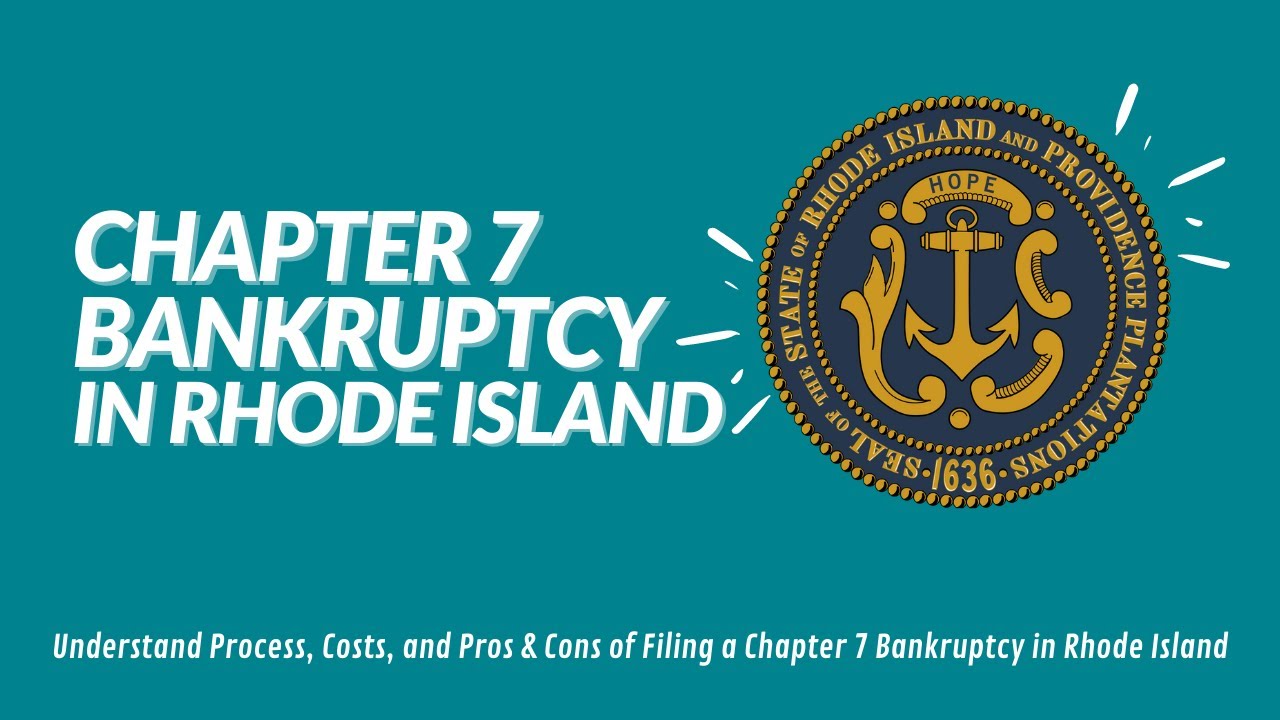Introduction: Understanding Bankruptcy in Rhode Island
Bankruptcy is a legal process that individuals and businesses in Rhode Island can use to overcome overwhelming debt and achieve a fresh financial start. It involves filing a petition in the Rhode Island Bankruptcy Court, which, upon approval, initiates a series of steps leading to the discharge of debts. It is crucial to understand the process and requirements involved in filing for bankruptcy in Rhode Island to navigate the system effectively.
Eligibility Criteria for Filing Bankruptcy in Rhode Island
To file for bankruptcy in Rhode Island, individuals must meet certain eligibility criteria. The most common types of bankruptcy filed by individuals are Chapter 7 and Chapter 13 bankruptcy. In Chapter 7 bankruptcy, individuals must pass the means test, which assesses their income and expenses to determine if they have the means to repay their debts. Chapter 13 bankruptcy, on the other hand, allows individuals with a regular income to develop a repayment plan to satisfy their debts over a specific period.
Determining the Appropriate Bankruptcy Chapter to File
Choosing the appropriate bankruptcy chapter is crucial, as it determines the type of relief one can obtain. Chapter 7 bankruptcy allows individuals to discharge unsecured debts, such as credit card bills and medical expenses, while Chapter 13 bankruptcy offers a repayment plan to restructure debt. A thorough analysis of one’s financial situation, income, and assets is necessary to determine which bankruptcy chapter best suits their needs and goals.
Gathering and Organizing Financial Documents
Before filing for bankruptcy in Rhode Island, individuals must gather and organize their financial documents. These include tax returns, bank statements, pay stubs, and documentation of assets and liabilities. Organizing these documents is essential for accurately assessing one’s financial situation and providing the necessary information during the bankruptcy process.
Retaining a Bankruptcy Attorney in Rhode Island
Seeking legal assistance from a bankruptcy attorney in Rhode Island is highly recommended to navigate the complex bankruptcy process successfully. An experienced attorney can provide guidance, explain the legal requirements, and represent individuals’ interests throughout the proceedings. They can also assist in preparing the necessary documents and ensure compliance with the bankruptcy laws in Rhode Island.
Preparing the Bankruptcy Petition and Schedules
Once all the required financial documents are gathered, individuals, with the help of their bankruptcy attorney, must prepare the bankruptcy petition and schedules. These documents provide detailed information about one’s financial affairs, including income, expenses, assets, and liabilities. Accuracy and completeness are crucial during this step to ensure a smooth and successful bankruptcy filing.
Filing the Bankruptcy Petition at the Rhode Island Bankruptcy Court
After the bankruptcy petition and schedules are prepared, they must be filed at the Rhode Island Bankruptcy Court. The filing fee, which varies depending on the bankruptcy chapter, must be paid at this stage. Once filed, the court issues a case number and assigns a bankruptcy trustee to oversee the case.
The Automatic Stay: Halting Creditor Collections
Upon filing for bankruptcy in Rhode Island, the automatic stay goes into effect. The automatic stay is a court order that halts all collection actions by creditors, including lawsuits, wage garnishments, and foreclosure proceedings. This stay provides individuals with immediate relief and the opportunity to reorganize their financial affairs without the constant pressure from their creditors.
Meeting of Creditors: What to Expect in Rhode Island
Approximately a month after the bankruptcy petition is filed, a meeting of creditors, also known as a 341 meeting, is scheduled. During this meeting, the bankruptcy trustee reviews the information provided in the bankruptcy petition and schedules. Creditors may also attend and ask questions regarding the debtor’s financial situation. It is essential to be prepared and cooperate fully during this meeting.
Completing Mandatory Debtor Education in Rhode Island
In Rhode Island, individuals filing for bankruptcy are required to complete a debtor education course. This course aims to provide individuals with the necessary financial management skills to move forward after bankruptcy. It must be completed within a specific timeframe for the bankruptcy process to proceed smoothly.
The Role of the Bankruptcy Trustee in Rhode Island
The bankruptcy trustee plays a vital role in the bankruptcy process in Rhode Island. They review the bankruptcy petition and schedules, conduct the meeting of creditors, and oversee the administration of the case. The trustee’s primary responsibility is to ensure the fair treatment of both the debtor and the creditors throughout the bankruptcy process.
Discharge of Debts and Post-Bankruptcy Considerations in Rhode Island
Upon completion of the bankruptcy process, individuals may be eligible for a discharge of their debts. A discharge releases debtors from personal liability for certain debts, providing them with a fresh start. However, certain debts, such as child support and student loans, may not be dischargeable. Additionally, individuals must consider rebuilding their credit and adopting responsible financial practices to ensure a better financial future post-bankruptcy.
Understanding the process for filing bankruptcy in Rhode Island is crucial for individuals seeking relief from overwhelming debt. By following the necessary steps, gathering required documents, and seeking professional guidance, individuals can navigate the bankruptcy process and work toward regaining financial stability. It is essential to consult with a bankruptcy attorney to ensure compliance with Rhode Island bankruptcy laws and enhance the chances of a successful bankruptcy filing.





